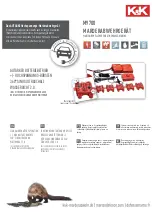
To guarantee effi cient operation of the SimpleHome system, it must be sized correctly. To do so, proceed as follows:
1) establish the number of power supply units required, on the basis of the number and type of devices installed;
2) establish the correct cable cross-sections for the Bus sections as well as the inputs (commands) and outputs (loads), on the basis of the
number of power supply units used and how they are installed within the system.
Establishing the number of power supply units required:
A single SimpleHome bus power supply unit is capable of supplying 2A continuously (2.2A peak): to guarantee effi cient operation of a system, its
nominal absorption must be established.
In fact, each SimpleHome device is powered directly by the 3-wire bus and therefore once the number and type have been identifi ed, it will be
possible to look up the nominal absorption of the system using this table:
N.B. It is always wise to add a little in reserve (e.g. 30%) in order to guarantee system continuity in the event that one of the power supply units
experiences a fault.
Establishing the required cross-sections:
To reduce the cross-section of the bus backbones in use, we recommend that power supply units are distributed as close as possible to the device
groups with the greatest power absorption instead of being concentrated in one area (especially for modules on DIN bars).
In fact, the nearer the power supply to the electrical nodes with the greatest absorption, the lower the current running along the bus backbone.
According to Ohm's law (V = Rline x Iabsorbed), the lower the current circulating, the lower the drop in voltage.
In terms of voltage, to guarantee effi cient operation of the SimpleHome system, the following rules should be observed:
1) power supply voltage of the devices on the bus = 24 Vdc +/- 5%
2) voltage, measured between the BUS DATA LINE wire and the BUS POWER SUPPLY NEGATIVE, should be greater than 4.7 V at every point in
the system (5 V is the optimum value).
N.B. If a device on the bus fails to communicate, apart from the various tests, we recommend measuring the voltage between the BUS DATA
LINE wire and the POWER SUPPLY NEGATIVE on the terminal board and making sure it is over 4.7 V. If it is not, we recommend installing a
power supply unit near the device.
Article
mA/
unit
Qty
mA/
Tot
ART. 20046501 - FLUSH-MOUNTED MODULE WITH 5 DIGITAL INPUTS
22
ART. 20046502 – SIMPLEHOME FLUSH-MOUNTED MODULE WITH 5 DIGITAL INPUTS AND 4 TRANSISTOR OUTPUTS
(5I4O)
22
ART. 20046912 – SIMPLEHOME FLUSH-MOUNTED INTERFACE MODULE WITH 2 RELAYS (RL2)
18
ART. 20046605 – SIMPLEHOME MODULE WITH 9 OPTICALLY COUPLED INPUTS AND 8 x 6A RELAY OUTPUTS ON
DIN RAIL (9I8O6A)
167
ART. 20046604 – SIMPLEHOME MODULE WITH 5 OPTICALLY COUPLED INPUTS AND 4 x 16A RELAY OUTPUTS ON DIN
RAIL (5I4O16A)
140
ART. 20046606 – SIMPLEHOME MODULE WITH 9 OPTICALLY COUPLED INPUTS AND 8 x 16A RELAY OUTPUTS ON DIN
RAIL (9I8O16A)
220
ART. 20046707 – SIMPLEHOME FLUSH-MOUNTED MODULE WITH 2 x 0-10 V ANALOGUE INPUTS (2I)
5
ART. 20046810 – SIMPLEHOME MODULE WITH 2 ANALOGUE INPUTS AND 2 ANALOGUE OUTPUTS ON DIN RAIL (2I2O)
30
ART. 20046811 – SIMPLEHOME ELECTRIC LOAD MANAGMENT MODULE ON DIN RAIL (TA)
17
ART. 20046708 – SIMPLEHOME FLUSH-MOUNTED TEMPERATURE SENSOR MODULE WITH 0-10 V OUTPUT (TEMP)
5
ART. 20046709 – SIMPLEHOME FLUSH-MOUNTED LCD THERMOSTAT MODULE
20
Total consumption
5
Summary of Contents for simplehome
Page 1: ...www comelitgroup com EN TECHNICAL MANUAL Technical manual for the SimpleHome system...
Page 35: ...Fastening Unfastening Sensor mounting 35...
Page 41: ...150 cm 120 cm Minitouch timer thermostat mounting 41...
Page 45: ...Minitouch mounting 150 cm 120 cm 45...
Page 76: ...Load management module 76...
Page 78: ...78...
Page 107: ...107...
Page 108: ...7 edizione 03 2014 cod 2G40001063...






































